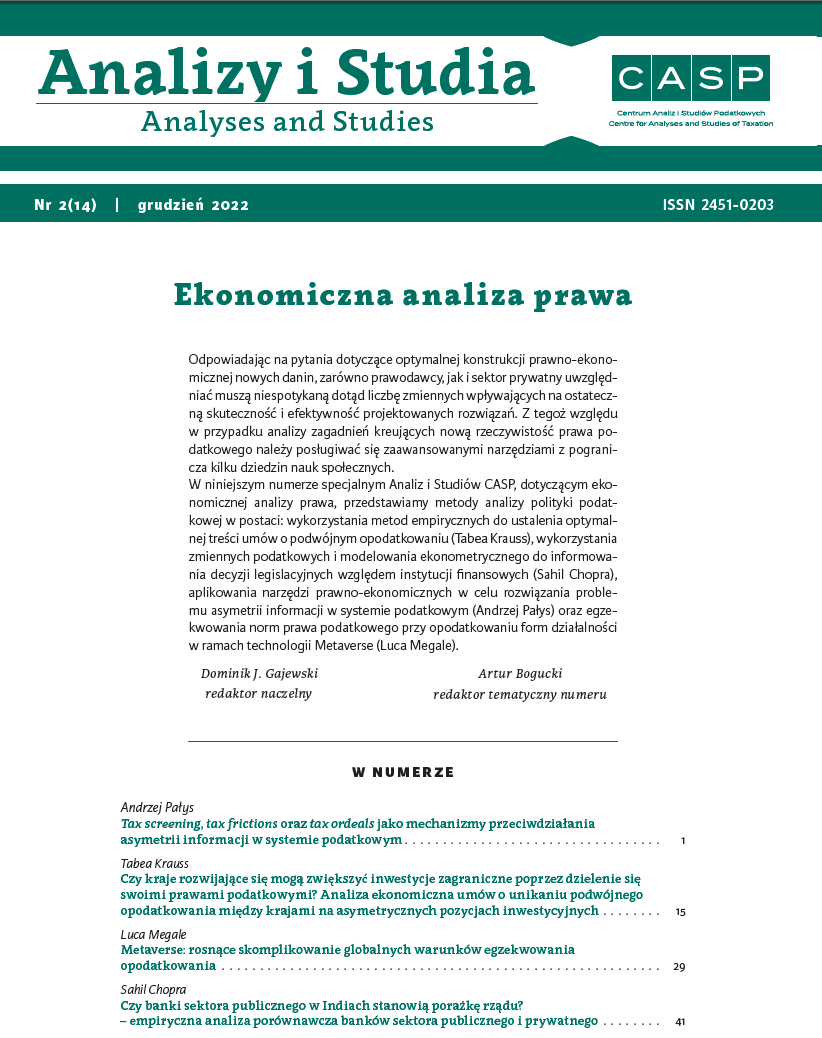Czy kraje rozwijające się mogą zwiększyć inwestycje zagraniczne poprzez dzielenie się swoimi prawami podatkowymi?
Analiza ekonomiczna umów o unikaniu podwójnego opodatkowania między krajami na asymetrycznych pozycjach inwestycyjnych
DOI:
https://doi.org/10.33119/ASCASP.2022.2.2Słowa kluczowe:
umowa o unikaniu podwójnego opodatkowania, bezpośrednie inwestycje zagraniczne, równanie grawitacyjne, międzynarodowa współpraca podatkowa, kraje rozwijające sięAbstrakt
Niniejszy artykuł stanowi analizę wpływu umów o unikaniu podwójnego opodatkowania na napływy BIZ zarówno do krajów rozwiniętych, jak i rozwijających się. W celu oszacowania ogólnego wpływu istnienia umowy podatkowej między symetrycznymi i asymetrycznymi parami państw na BIZ zastosowano równanie modelu grawitacyjnego. Ponadto w tym samym równaniu grawitacyjnym, jako zmienne objaśniające, zostały zastosowane wskaźniki ukazujące zakres praw do nałożenia podatku u źródła wynegocjowany w ramach umowy podatkowej. Wykazano, że zawarcie traktatu podatkowego w ogóle, a w szczególności umowy w znacznym stopniu zabezpieczającej możliwość nałożenia podatku u źródła, jest negatywnie skorelowane z napływami BIZ (–23,05%). Silniejszy efekt można zaobserwować w przypadku napływów BIZ do krajów rozwijających się (–29,53%), co wskazuje na to, że kraje stają przed koniecznością wypracowania kompromisu pomiędzy przyciąganiem BIZ ze strony przedsiębiorstw międzynarodowych, a generowaniem dochodów podatkowych z działalności gospodarczej prowadzonej na ich własnym terytorium.
Bibliografia
Baier, F.J., & Welfens, P.J. (2018). BREXIT and Foreign Direct Investment: Key Issues and New Empirical Findings. International Journal of Financial Studies, 6, 46–67.
Baker, P.L. (2014). An Analysis of Double Taxation Treaties and their Effect on Foreign Direct Investment. International Journal of the Economics of Business, 21, 341–377.
Blonigen, B.A., & Davies, R.B. (2002). Do Bilateral Tax Treaties Promote Foreign Direct Investment? Working Paper 8834. NBER – National Bureau of Economic Research, https://www.nber.org/papers/w8834
Bobkova, B. (2012). Gravity model estimation using panel data – is logarithmic transformation advisable? Prague: Charles University in Prague.
CEPII (2021). CEPII – Gravity. CEPII. Research and Expertise on the World Economy, http://www.cepii.fr/CEPII/en/bdd_modele/presentation.asp?id=8
Coupe, T., Orlova, I., & Skiba, A. (2009). The Effect of Tax and Investment Treaties on Bilateral FDI Flows to Transition Economies. In: K. P. Sauvant, L.E. Sachs, The Effect of Treaties on Foreign Direct Investment: Bilateral Investment Treaties, Double Taxation Treaties, and Investment Flows (Chapter 24). New York: Oxford University Press.
Egger, P., Larch, M., Pfaffermayr, M., & Winner, H. (2006). The Impact of Endogenous Tax Treaties on Foreign Direct Investment: Theory and Evidence. The Canadian Journal of Economics, 39, 901–931.
Fischer, J. (2010). Accounting for Unobserved Country Heterogeneity in Happiness Research: Country Fixed Effects versus Region Fixed Effects (MPRA Paper No.22272). Munich Personal RePEc Archive, https://mpra.ub.uni-muenchen.de/22272/
Hearson, M. (2016). Measuring Tax Treaty Negotiation Outcomes: the ActionAid Tax Treaties Dataset. ICTD Working Paper 47. Brighton: Institute of Development Studies.
Hearson, M. (2018). When Do Developing Countries Negotiate Away their Corporate Tax Base? Journal of International Development (30), 233–255.
Hill, T.D., Davis, A.P., Roos, J., & French, M.T. (2020). Limitations of Fixed-Effects. Sociological Perspectives, Vol. 63, 357–369.
ICTD (2020). Tax Treaties Explorer – Data and Documentation. International Centre for Tax and Development (ICTD), https://www.treaties.tax/en/data/
Kaufmann, D., & Kraay, A. (2020). Worldwide Governance Indicators, info.worldbank.org, http://info.worldbank.org/governance/wgi/
Lejour, A. (2014). The Foreign Investment Effects of Tax Treaties. Working Paper. Oxford University Centre for Business Taxation – Working Paper Series, 14, 1–26.
Neumayer, E. (2007). Do Double Taxation Treaties Increase Foreign Direct Investment to Developing Countries? Journal of Development Studies, 43, 1501–1519.
Neumayer, E., & Barthel, F. (2012). Competing for Scarce Foreign Capital: Spatial Dependence in the Diffusion of Double Taxation Treaties. International Studies Quarterly, 56, 645–660.
OECD (2008). OECD Benchmark Definition of Foreign Direct Investment. Fourth Edition 2008. Paris: OECD. Retrieved from: Foreign Direct Investment Statistics. Explanatory Notes, https://www.oecd.org/daf/inv/FDI-statistics-explanatory-notes.pdf
Petkova, K., Stasio, A., & Zagler, M. (2020). On the Relevance of Double Tax Treaties. International Tax and Public Finance, 27, 575–605.
Quak, E.-J., & Timmis, H. (2018). Double Taxation Agreements and Developing Countries. Brighton: Institute of Development Studies.
Rixen, T. (2010). Bilateralism or multilateralism? The political economy of avoiding international double taxation. European Journal of International Relations, 16(4), 589–614.
Rixen, T., & Schwarz, P. (2009). Bargaining over the Avoidance of Double Taxation: Evidence from German Tax Treaties. FinanzArchiv, 65, 442–471.
Shepherd, B. (2016). The Gravity Model of International Trade: A User Guide (An updated version). Bangkok: United Nations Economic and Social Commission for Asia and the Pacific.
Silva, J.S., & Tenreyro, S. (2006). The Log of Gravity. The Review of Economics and Statistics, 66, 641–658.
Tenreyro, S., & Santos Silva, J. (2011). Further simulation evidence on the performance of the Poisson pseudomaximum likelihood estimator. Economics Letters, 112, 220–222.
UNCTAD (2021). United Nations. UNCTAD. Retrieved from: FDI/MNE Database – World Investment Report, www.unctad.org/fdistatistics
World Bank Group (2021). International Centre for Settlement of Investment Disputes (ICSID). Database of Bilateral Investment Treaties. World Bank Group, https://icsid.worldbank.org/resources/databases/bilateral-investment-treaties
Pobrania
Opublikowane
Jak cytować
Numer
Dział
Licencja
Autor (Autorzy) artykułu oświadcza, że przesłane opracowanie nie narusza praw autorskich osób trzecich. Wyraża zgodę na poddanie artykułu procedurze recenzji oraz dokonanie zmian redakcyjnych. Przenosi nieodpłatnie na Oficynę Wydawniczą SGH autorskie prawa majątkowe do utworu na polach eksploatacji wymienionych w art. 50 Ustawy z dnia 4 lutego 1994 r. o prawie autorskim i prawach pokrewnych – pod warunkiem, że praca została zaakceptowana do publikacji i opublikowana.
Oficyna Wydawnicza SGH posiada autorskie prawa majątkowe do wszystkich treści czasopisma. Zamieszczenie tekstu artykuły w repozytorium, na stronie domowej autora lub na innej stronie jest dozwolone o ile nie wiąże się z pozyskiwaniem korzyści majątkowych, a tekst wyposażony będzie w informacje źródłowe (w tym również tytuł, rok, numer i adres internetowy czasopisma).
Osoby zainteresowane komercyjnym wykorzystaniem zawartości czasopisma proszone są o kontakt z Redakcją.
Autor zgadza się na dalsze udostępnianie pracy wg wymagań licencji CC-BY-NC






















